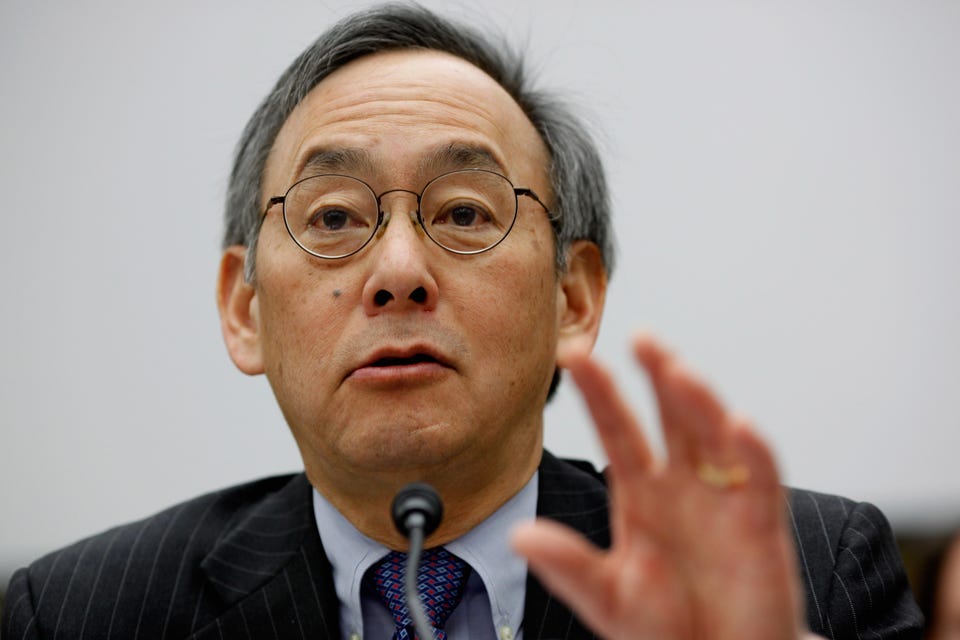Sustainability Steven Chu Calls For A Fourth Agricultural Revolution Jeff McMahon Senior Contributor Opinions expressed by Forbes Contributors are their own. From Chicago, I write about climate change, green technology, energy. New! Follow this author to improve your content experience.
Got it! Jun 30, 2022, 12:50am EDT | Share to Facebook Share to Twitter Share to Linkedin Former energy secretary Steven Chu, a Nobel-Prize winning physicist, has turned his attention . . .
[+] increasingly to greenhouse gas emissions from agriculture. (Photo by Chip Somodevilla/Getty Images) Getty Images The first three agricultural revolutions allowed the human population to blossom by the billions, but they also had—in the words of Nobel Laureate Steven Chu—“unintended consequences. ” The first agricultural revolution included the domestication of wheat, rice, cattle and chickens, yeast for bread and the first irrigation.
The second spurred population growth through crop rotation, improvement of the plow, a suite of policy changes including the division of the commons into parcels of private property. The third was driven by the development of artificial fertilizers (mostly from natural gas), and by Norman Borlaug’s cultivation of much more productive strains of wheat just in time to feed an exploding human population. “There were some unintended consequences of these multiple industrial and agricultural revolutions,” Chu said this month at the Caltech Energy 10 conference, “of greenhouse gas emissions, CO2, methane, nitrous oxide, fluorinated gases, and they have changed our climate.
” Now humanity finds itself on a collision course with a fresh set of limitations: the agricultural sector has consumed half of the earth’s arable land while destabilizing the climate whose relative stability had made agriculture possible. Agriculture, said Chu, has only recently begun to get the attention it deserves in the global conversation on climate. It produces more greenhouse gases than energy production, and it offers some of the best opportunities—“the lowest hanging fruit”—for mitigation.
“There should be more efficient ways of doing this,” he said of feeding humanity, “and we really need a fourth agricultural revolution: • “We need improved crop yields with less fossil-based fertilizers and pesticides. ” MORE FOR YOU Is Carbon Capture Another Fossil Fuel Industry Con? Sustainable Fashion Wants Brands To Redefine Business Growth Trouble With Predicting Future Of Transportation Is That Today Gets In The Way • “There’s an opportunity to restore carbon in the soil which we have been depleting since the beginning of agriculture. ” • There is a need for plants that are more resistant to heat and drought.
• There is a need for substitutes for beef and milk. “If beef and dairy cattle were a country,” Chu said, “their roughly five gigatons of co2 equivalent per year would be more emissions than any other country except China, and, well, actually they’re equal to the U. S.
(emissions) at the moment. ” • And if fallow fields are used to grow biomass for carbon capture, Chu said, those plants should be optimized for growth through genetic engineering. Genetic engineering may prove the most problematic feature of Chu’s Fourth Revolution, he acknowledges, at least politically.
“Unfortunately the GMO has a very bad reputation based on Roundup-Ready crops,” he said, referencing crops genetically modified to resist Monsanto’s herbicide Roundup, which had the unintended consequence, according to Harvard University , of producing Roundup-Ready “superweeds” that are much harder to control. GMOs could have enjoyed a better reputation had their fame rested on genetically-fortified golden rice or on eggplant and cotton genetically modified with bacillus thuringiensis (BT) to resist pests. “So that’s unfortunate,” Chu said.
“You can’t undo history, but I’ll go back to what Norman Borlaug said: We’ll need GMOs to feed a population of 11 billion. ” Chu is a Stanford University physicist who won the 1997 Nobel Prize for Physics for using lasers to trap atoms, but he is also a professor of molecular and cellular physiology and a board member for Oatly, a company that produces an alternative milk made from Oats. Genetic modification could increase the protein content of plant milks, he said, could spur faster-growing salmon, could nurture microbes in corn roots that slash the plant’s need for added fertilizer.
“As I’ve been trying to point out, we’ve been genetically modifying plants and animals for over 4,000 years,” he said. “The policy is going to be really measured by people’s ease with accepting the technology. You have to say we are concerned about unintended consequences.
You have to roll out very carefully. ” “As we fish out the seas, there’s an opportunity here to do some genetic modification, but you have to be careful because you don’t want fish to be released in the wild genetically modified until you’re absolutely sure—and that could take decades—so there are no unintended consequences. ” Watch Steven Chu’s presentation at CalTech Energy 10: Follow me on Twitter or LinkedIn .
Check out my website . Jeff McMahon Editorial Standards Print Reprints & Permissions.
From: forbes
URL: https://www.forbes.com/sites/jeffmcmahon/2022/06/30/steven-chu-calls-for-a-fourth-agricultural-revolution/



